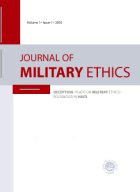The War on Terror and the Ethics of Exceptionalism
Fritz Allhoff, “The War on Terror and the Ethics of Exceptionalism”, Journal of Military Ethics 8.4 (2009): 265-288.
Abstract: The war on terror is commonly characterized as a fundamentally different kind of war from more traditional armed conflict. Furthermore, it has been argued that, in this new kind of war, different rules, both moral and legal, must apply. In the first part of this paper, three practices endemic to the war on terror—torture, assassination, and enemy combatancy status—are indentified as exceptions to traditional norms. The second part of the paper uses these examples to motivate a generalized account of exceptionalism; a taxonomy of different exceptionalisms is derived, including temporal, spatial, and group-based exceptionalisms. The third part of the paper considers the ethical status of exceptionalism, paying particular attention to the group-based exceptionalisms that are argued to be prevalent in the war on terror. It is concluded that there is nothing inherently wrong with group- based exceptionalism and, furthermore, that the proper locus of ethical evaluation lies not with the norms are that being excepted, but rather with the groups that are being excepted from them.

